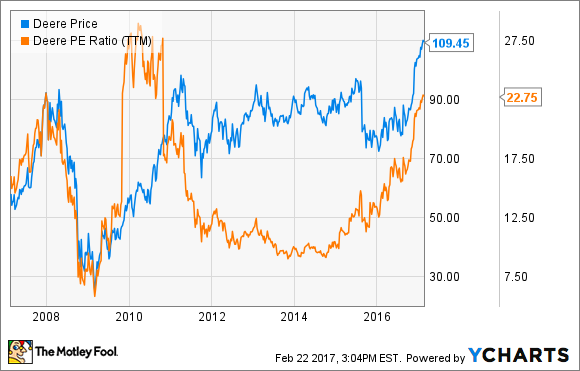Every time a stock jumps or crashes, investors want to believe that the market is correctly pricing the stock. That may not always be the case, as the market’s shortsightedness can sometimes push an undeserving stock into overbought territory or punish one that’s worthy of more attention. As you may have guessed, finding such incorrectly priced stocks can either save you from big losses or fetch you great returns.
So we asked our contributors to share the one stock they believe the market is wrong about today. They came up with three notable names: Under Armour (NYSE: UA) (NYSE: UAA) , Teva Pharmaceutical Industries (NYSE: TEVA) , and Deere & Company (NYSE: DE) . Read on to know how the market may be misjudging these stocks.

Image source: Getty Images
This sportswear company has comeback potential
Keith Noonan (Under Armour): Under Armour stock has gotten crushed over the past six months. In October, management backed away from its long-standing fiscal 2018 operating income target of $ 800 million, and that was just the first round of bad news. Next, fourth-quarter sales growth came in at just 12%, following company projections that it would deliver its 27th consecutive quarter of greater than 20% growth. Then, after calling for fiscal 2017 sales growth in the low-20% range, new guidance of 11%-12% growth and a $ 100 million reduction in operating income dealt a huge blow to investor confidence.
Touting a company’s growth potential when it’s missing its own guidance by wide marks may be counterintuitive, but I think the big sell-offs, combined with opportunities in international markets, direct-to-consumer sales, and the ability to deliver a more favorable product lineup, point to an opportunity for long-term investors. Fiscal 2016 saw international sales increase 63%, while direct-to-consumer revenue increased 27% to reach 31% of total sales, and its connected fitness category posted 50% top-line growth. Footwear sales growth is still strong, increasing 50% year over year, and a push into premium offerings presents an avenue toward long-term sales and earnings momentum.
Slowing domestic sales growth has been the biggest source of the sportswear company’s recent woes, and the trend is concerning, but the brand still has huge room for expansion — particularly in China, where 760 million people watched an NBA game last season and Under Armour endorser Stephen Curry is one of the most popular players. Roughly 85% of the company’s sales come from its Americas segment, and it’s positioned to deliver international market share gains that should reduce the impact of shaky domestic performance in the future.
Under Armour stock could continue to see turbulence in the short term, but the long-term picture remains bright.
Self-inflicted wounds make this medical giant a reasonable investment
Chuck Saletta (Teva Pharmaceutical Industries): Many investors would shy away from a company that just paid over half a billion dollars to settle charges that it violated the Foreign Corrupt Practices Act. Still more would not want to invest in a company going through a management shuffle that saw its CEO step down without a clear succession plan. And even more would want to avoid owning shares in a company whose blockbuster product was expected to shrink substantially because of emerging competitive threats.
All those factors describe Teva Pharmaceutical Industries today. The company’s shares are down around 40% from their 52-week high, and more than half if you look back to the highs set in 2015. With all those problems it’s facing, its shares deserve a significant part of the beating they’ve received.
Despite those challenges, though, Teva has some redeeming qualities. Perhaps its biggest strength is that it’s the largest generic-drug maker in the world. That’s a business where know-how and scale matter. Scale keeps unit costs down — an important part of generic manufacturing. Know-how helps it navigate the legal and manufacturing controls minefield it takes to get approval so it can continue to make those generics.
Indeed, last year, Teva improved its position in the generic-drug industry by acquiring what was formerly Allergan ‘s generics business. Synergy savings and additional scale benefits from that acquisition haven’t been fully baked in to the company’s operating results — and they probably won’t be, at least until 2019.
The recent past has been rocky, and with the looming loss of patent protection for its blockbuster multiple sclerosis drug, Copaxone, the near-term future is also likely to be rough. But all that pain and all those problems are known and priced into Teva’s shares today. As a result, the company merely needs to avoid more massive missteps in the future and deliver its anticipated acquisition synergy savings for its shares to appear reasonably valued today.
This agricultural stock may have run its course
Neha Chamaria ( Deere & Company ): While my fellow Fools have each picked a stock that they believe is underpriced, I’ll make a different call and highlight one stock that I think is getting ahead of itself. Farm-equipment giant Deere & Company is up about 6% year to date and almost 42% in the past year, as of this writing. I’m pretty surprised to see the stock heading higher despite the uncertainty in agricultural markets. In fact, Deere projects its earnings per share to decline another 8% in 2017 after a difficult last year.
Deere’s recent earnings beat and the decelerating pace of its sales decline have perhaps fueled the market’s hopes. While that’s not entirely misplaced, I think it’s still early to call the bottom for the farm-equipment industry, especially after the U.S. Department of Agriculture just projected net farm income to decline almost 9% this year. That’ll be the fourth straight year of decline, confirming that the agricultural cycle isn’t turning around just yet. Deere’s equipment sales, of course, are linked closely to farm income.
What’s bothering me most right now is that the market has pushed Deere’s stock so high in recent months that it’s already trading way above its “golden period” days of 2011-2014, when net farm income soared to its highest levels since at least 2000.

Data source: YCharts.
Agricultural cycles can last several years, and it isn’t easy to predict a turnaround, given the several unpredictable macro factors, such as climatic conditions, at play. You may also want to know that Berkshire Hathaway unloaded its entire stake in Deere last quarter, after selling portions over the past few quarters. While that didn’t affect Deere’s stock price much, as Berkshire’s stake in the company was a small one, the fact that Warren Buffett and his managers didn’t find Deere valuable enough to be part of Berkshire’s portfolio anymore is worth reflecting on. There’s no denying that Deere remains the undisputed leader in the farm-equipment industry, but the industry is as unpredictable as can be. Remember that if you’re betting on Deere at current prices.
10 stocks we like better than Deere & Company
When investing geniuses David and Tom Gardner have a stock tip, it can pay to listen. After all, the newsletter they have run for over a decade, Motley Fool Stock Advisor , has tripled the market.*
David and Tom just revealed what they believe are the 10 best stocks for investors to buy right now… and Deere & Company wasn’t one of them! That’s right — they think these 10 stocks are even better buys.
Click here to learn about these picks!
*Stock Advisor returns as of February 6, 2017
Chuck Saletta owns shares of Teva Pharmaceutical Industries. Keith Noonan has no position in any stocks mentioned. Neha Chamaria has no position in any stocks mentioned. The Motley Fool owns shares of and recommends Berkshire Hathaway (B shares), Under Armour (A Shares), and Under Armour (C Shares). The Motley Fool recommends Teva Pharmaceutical Industries. The Motley Fool has a disclosure policy .
The views and opinions expressed herein are the views and opinions of the author and do not necessarily reflect those of Nasdaq, Inc.
Plantations International